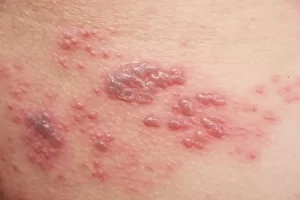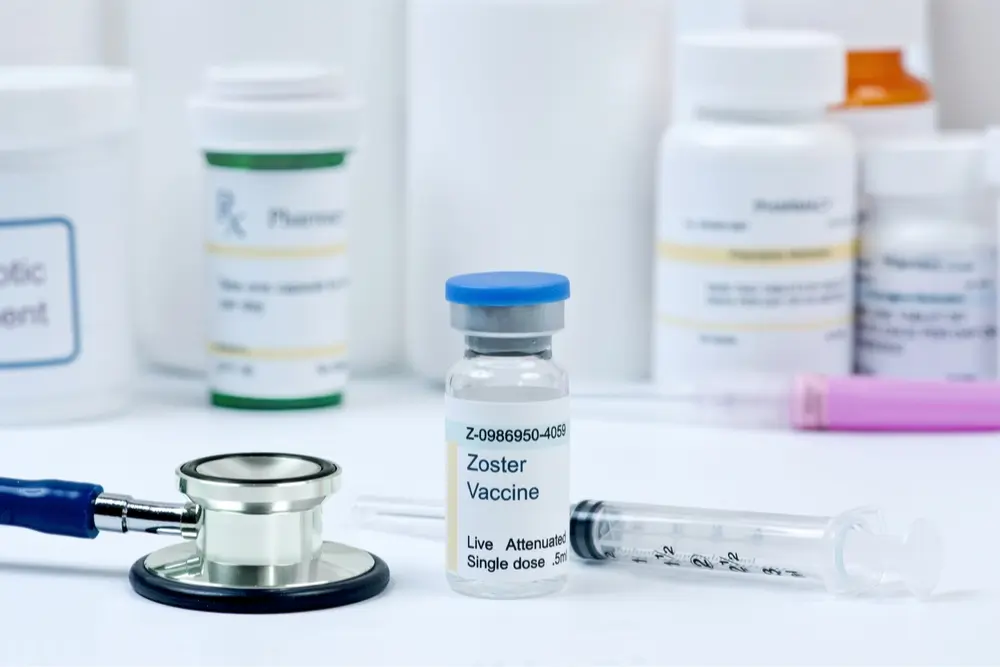How do you get Shingles?
What is Shingles?
- Shingles (also known as Herpes Zoster) is a painful blistering rash caused by the same virus that causes Chicken Pox.
- Once you’ve had Chicken Pox at some point in your life, you can later get Shingles. This is because the Chicken Pox virus never fully leaves your body but lies dormant or silent, in your nerves.
- In most people the virus stays inactive, and doesn’t cause further trouble. But around 1 in 4 people will experience reactivation of the virus at some point later in life- it spreads along the nerve it has been silently living in, leading to a typical blistering rash in the area of skin supplied by that nerve.
What are the symptoms of Shingles?
Symptoms of shingles include:
- Burning pain and/or tingling- this is often the first symptom, and happens in the affected area of skin before the rash appears. The shingles rash will follow the nerve in which the virus is spreading- so it tends to form in a strip or a patch on one side of the body or face. It does not usually spread to other parts of the body.
- Tiredness or a feeling of general unwellness
- The shingles rash starts as small red raised bumps which develop into fluid-filled blisters and may continue to form over around 5 days. These blisters then break down and become crusty.
- It may take 4 or 5 weeks for the shingles rash to clear completely and can be very sensitive even to light touch.
How do you get Shingles?
- Shingles is when the Chicken Pox virus you had earlier in life becomes active again and spreads along a nerve.
- You cannot catch Shingles from someone else.
- However, if you’ve never had Chicken Pox or a Chicken Pox vaccine, it is possible to catch Chicken Pox if you’re exposed to someone who has Shingles!
Are there risk factors for developing Shingles?
Yes, certain factors can put you at risk, including:
- Age- it’s more common for older people to get shingles, particularly after 50. This may be due to the immune system becoming weaker over time.
- Reduced immunity- for example, due to cancer treatment, various medications that affect immunity, or medical conditions that weaken the immune system (e.g. HIV or certain types of cancer).
Is there a test for Shingles?
The diagnosis will usually be easily made when a doctor looks at the rash
However, if there is any doubt, a swab can be taken and sent to the lab. It’ll take a few days for the results to come back.
Is Shingles serious?
Usually not, though it’s quite unpleasant and painful at the time.
However, some people may get complications. If a person has a weak immune system for some reason, the infection may spread through the body and cause serious illness. Others may get Post- herpetic Neuralgia – this is continued nerve pain after the rash has settled. It can go on for months or years in some people. If Shingles occurs around the eye it can cause blindness if not managed properly. Anyone who gets shingles in the eye area should see an ophthalmologist (eye specialist) very urgently.
What is the treatment for Shingles?
- Antiviral medications can help if started within 3 days of the rash appearing. They may shorten the duration and severity of symptoms, as well as potentially reducing the risk of postherpetic neuralgia (a complication of Shingles which causes nerve chronic pain)
- Over-the-counter painkillers may be helpful, and topical treatments such as cool wet compresses and aluminium acetate lotion can help with the discomfort.
Is there a Shingles Vaccine?
Yes, there is a Shingles vaccine. Immunisation against Shingles is available in Australia for people aged 70 years and over, as they are most at risk of severe symptoms and Post-herpetic Neuralgia, with catch up program available for anyone up to the age of 79, till the year 2021.
However, people between the ages of 50 and 70 can avail of the vaccine if they get a prescription from their doctor.
It is contraindicated in people who have medical conditions that cause weakened immunity.
In the over 70s age group, the Shingles vaccine appears to reduce the risk of Shingles by 40%, and the incidence of Post-herpetic Neuralgia by about 66%.
If you have more concerns about Shingles or the Shingles Vaccine, speak to your doctor.
Getting a Mental Health Care Plan in Australia: Your Guide
Getting a Mental Health Care Plan in Australia: Your Guide Mental health matters—and if you’re feeling overwhelmed, anxious, or down, a mental health care plan can help. But what is it, and how do [...]
UTI Symptoms and Treatment: What You Need to Know
UTI Symptoms and Treatment: What You Need to Know Urinary Tract Infections (UTIs) are common, uncomfortable, and often disruptive. But what exactly are the signs to watch for, and how can you get relief [...]
Free Mental Health Care Plan Online | Bulk-Billed by Qoctor
Free Mental Health Care Plan Online | Bulk-Billed by Qoctor Discover how to get a free, bulk-billed Mental Health Care Plan (MHCP) in Australia through Qoctor's telehealth service. Accessing [...]






